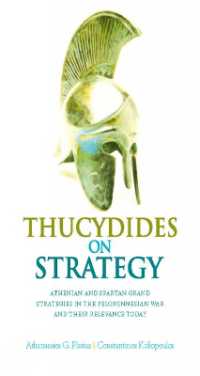- ホーム
- > 洋書
- > 英文書
- > Literary Criticism
Full Description
First comprehensive look at how today's German literary fiction deals with questions of German victimhood.
In recent years it has become much more accepted in Germany to consider aspects of the Second World War in which Germans were not perpetrators, but victims: the Allied bombing campaign, expulsions of "ethnic" Germans, mass rapes of German women, and postwar internment and persecution. An explosion of literary fiction on these topics has accompanied this trend. Sebald's The Air War and Literature and Grass's Crabwalk are key texts, but there are many others; the great majority seek not to revise German responsibility for the Holocaust but to balance German victimhood and German perpetration. This book of essays is the first in English to examine closely the variety ofthese texts. An opening section on the 1950s -- a decade of intense literary engagement with German victimhood before the focus shifted to German perpetration -- provides context, drawing parallels but also noting differences between the immediate postwar period and today. The second section focuses on key texts written since the mid-1990s shifts in perspectives on the Nazi past, on perpetration and victimhood, on "ordinary Germans," and on the balance between historical empathy and condemnation.
Contributors: Karina Berger, Elizabeth Boa, Stephen Brockmann, David Clarke, Mary Cosgrove, Rick Crownshaw, Helen Finch, Frank Finlay, Katharina Hall, Colette Lawson, Caroline Schaumann, Helmut Schmitz, Kathrin Schödel, and Stuart Taberner.
Stuart Taberner is Professor of Contemporary German Literature, Culture, and Society at the University of Leeds. Karina Berger holds a PhD in German from the University of Leeds.
Contents
Introduction - Stuart Taberner and Karina Berger
W. G. Sebald and German Wartime Suffering - Stephen Brockmann
The Natural History of Destruction: W. G. Sebald, Gert Ledig, and the Allied Bombings - Colette Lawson
Expulsion Novels of the 1950s: More than Meets the Eye? - Karina Berger
"In this prison of the guard room": Heinrich Böll's Briefe aus dem Krieg 1939-1945 in the Context of Contemporary Debates - Frank Finlay
Family, Heritage, and German Wartime Suffering in Hanns-Josef Ortheil, Stephan Wackwitz, Thomas Medicus, Dagmar Leupold, and Uwe Timm - Helmut Schmitz
Lost Heimat in Generational Novels by Reinhard Jirgl, Christoph Hein, and Angelika Overath - Elizabeth Boa
"A Different Family Story": German Wartime Suffering in Women's Writing by Wibke Bruhns, Ute Scheub, and Christina von Braun - Caroline Schaumann
The Place of German Wartime Suffering in Hans-Ulrich Treichel's Family Texts - David Clarke
"Why only now?": The Representation of German Wartime Suffering as a "Memory Taboo" in Günter Grass's Novella Im Krebsgang - Katharina Hall
Rereading Der Vorleser, Remembering the Perpetrator - Rick Crownshaw
Narrating German Suffering in the Shadow of Holocaust Victimology: W. G. Sebald, Contemporary Trauma Theory, and Dieter Forte's Air Raids Epic - Mary Cosgrove
Günter Grass's Account of German Wartime Suffering in Beim Häuten der Zwiebel: Mind in Mourning or Boy Adventurer? - Helen Finch
Jackboots and Jeans: The Private and the Political in Uwe Timm's Am Beispiel meines Bruders - Frank Finlay
Memory-Work in Recent German Novels: What (if Any) Limits Remain on Empathy with the "German Experience" of the Second World War? - Stuart Taberner
"Secondary Suffering" and Victimhood: The "Other" of German Identity in Bernhard Schlink's "Die Beschneidung" and Maxim Biller's "Harlem Holocaust" - Kathrin Schodel








